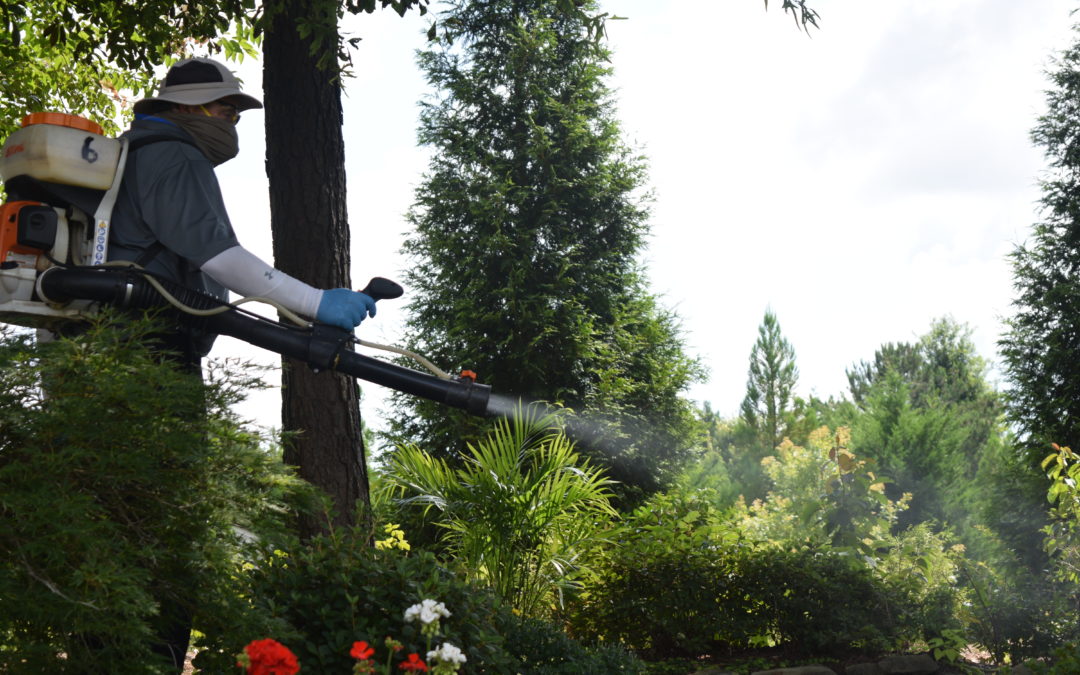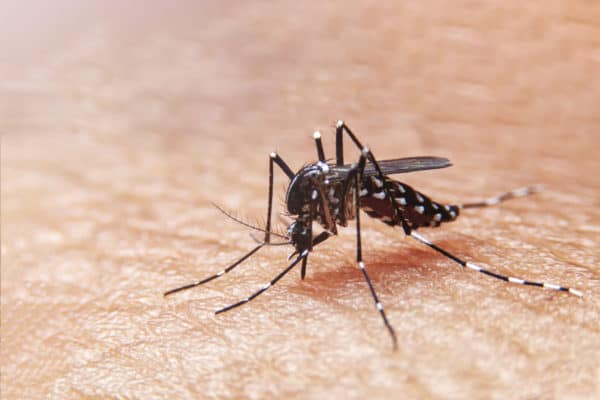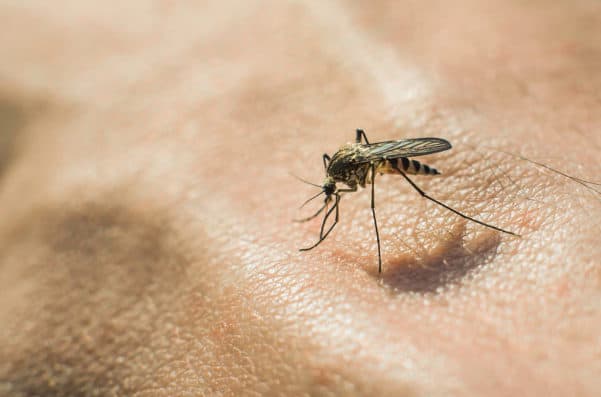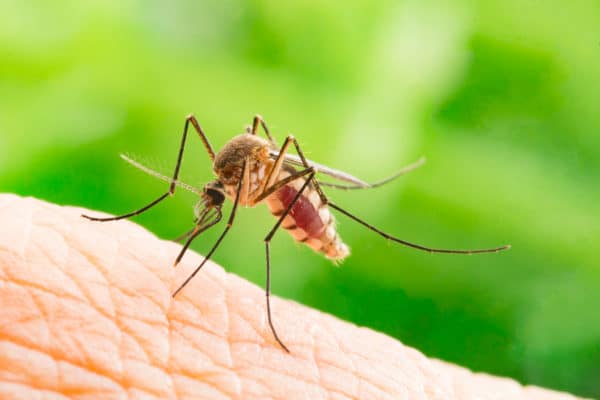READY TO GET STARTED?
REQUEST A FREE ESTIMATE
Fill out the form below or call (888) 466-7849 for a free, no-obligation estimate.

Mosquito season is right around the corner! Heat and humidity during these months combine to provide an ideal environment for mosquitoes to thrive. The season usually starts in the spring and peaks over the summer. Besides leaving behind itchy, red welts, these nuisance pests are dangerous to humans by vectoring serious diseases like Zika virus, West Nile virus, and chikungunya. Fortunately, there are several green pest control options you can utilize as an eco-friendly alternative to control mosquitoes. Here are 3 steps you can take for green mosquito control.
The first step to controlling mosquitoes is identifying and eliminating what attracts them in the first place. Mosquitoes will come around in search of two things: nesting sites and resting sites.
Where do mosquitoes breed? Every species of mosquito lays its eggs in water. While the type of water source may vary between species, it only takes a minute amount of water for mosquitoes to hatch and develop. Get rid of any potential breeding sites by:
Once mature, adult mosquitoes will often rest in shady areas that are protected from the wind. Some common resting sites include trees, shrubs, potted plants, patios, and front entryways.
Any time you can protect yourself from mosquito bites you should. Prevent mosquito bites by:
Yards and climates vary across the region so the effectiveness and longevity of mosquito treatments will vary from home to home. Regardless of where you live or what kind of home you have, a green mosquito control program can be effective at helping control mosquito populations. Green mosquito control utilizes eco-friendly products that are just as effective as traditional products.
A complete green reduction program includes monthly mosquito treatments during mosquito season. Green treatments use products that are derived from flowers and botanicals and area only applied to the areas where they are needed instead of over the entire yard. They are effective at reducing both adult and larvae populations.
The green mosquito reduction program includes an inspection to identify resting and nesting sites; larvacide and adulticides to target all aspects of the population; source reduction and elimination by removing any areas of standing water; and a service guarantee where they will come back between treatments if needed, usually at no cost.
If you have a problem with mosquitoes or any other pests, contact a professional pest control company who can provide you with a thorough inspection and the most up to date traditional pest control and green treatment options available for you.
Termites: Prevent Before They Infest!

The peak of mosquito season is from April to October. During this time, mosquitoes invade, leaving behind itchy bites and aggravation. They are also capable of spreading serious diseases such as Zika and West Nile virus. While many of us take precautions by using mosquito repellent and wearing long sleeved clothing, sometimes these prevention techniques just aren’t enough. A mosquito treatment is often needed to help control mosquito populations.
There are two options to mosquito treatments – green and traditional. Green mosquito treatments utilize products derived from flowers and bacteria that are only applied to the areas where they are needed, minimizing their impact on surrounding areas. These treatments also work on adult and larvae.
A traditional mosquito treatment consists of 5 steps:
How much does a mosquito treatment cost? Treatments typically last between 21 and 30 days and should be applied as often. Most treatments are billed per 1/4 acre or per 1/2 acre. Generally only the perimeter of the yard is treated, concentrating on areas of foliage and woods. The average cost of a mosquito treatment is between $350 and $500 per season for a 1/4 to 1/2 acre property. This cost can range anywhere from $325 up to $1900 depending on the size of the property and the frequency of treatments. Mosquito treatments are performed on a monthly basis with an average of $70 to $100 cost per visit. Some companies will offer a discount on this rate if you sign up for recurring treatments.
While there are DIY mosquito treatments available, a professional pest control company has the experience, training, and equipment to get rid of mosquitoes and keep them away. Most will utilize an Integrated Pest Management (IPM) program that combines a variety of treatment and control methods to eliminate mosquitoes with minimal impact to the surrounding environment.
Protecting Your Garden From Birds
The 411 on Granddaddy Long Legs
The Summer Big Three: Roaches, Mosquitoes, & Termites

In some places, especially the southern United States, mosquito season can seem like it lasts forever – or at least for the majority of the year; and in some cases it actually does. Mosquitoes are most often associated with the hot summer months but the season actually begins earlier than that and can run through fall. Besides being annoying, mosquitoes can also pose serious health hazards to both humans and animals. Mosquitoes are known to transmit serious diseases like West Nile virus, Zika virus, chikungunya, and eastern equine encephalitis.
Because mosquito activity is primarily driven by temperature, mosquito seasons vary from region to region. Some species of mosquitoes hibernate during the winter and emerge when the weather warms up. Other species die off when cold weather arrives and their offspring hatch from previously laid eggs in the spring. Regardless of the species, most mosquito activity begins when temperatures consistently reach above 50 degrees Fahrenheit. As temperatures increase, so does mosquito activity, making peak mosquito season in the hot summer months. As the weather begins to cool down, so does mosquito activity. Those mosquito species that hibernate over winter will begin looking for their winter dwellings in hollow logs, abandoned animal burrows, and other places. Those mosquito species that don’t hibernate will begin dying off as temperatures drop below 50 degrees. Because of this, those places with warmer climates will have mosquito season begin earlier and last longer than those with cooler climates.
There are some do-it-yourself pest control steps that you can take to help minimize mosquitoes on and around your property. Try to implement these before mosquito season starts when temperatures are still below the 50 degree mark. Waiting until mosquito season means the breeding population will already be established and will be much harder to control.
Even with these proactive steps, mosquitoes can still be difficult to control. Consider investing in a professional mosquito control program that can reduce mosquitoes, help prevent mosquito bites, and limit your risk of mosquito-borne disease. A mosquito control program from a licensed pest control company can provide you with treatments throughout mosquito season.
How to Help Your Lawn During Late Summer
Are Millipedes Helpful or Harmful?
Pest Control for Basements and Attics

Mosquitoes are one of the most common pests active during the spring and summer months. While most consider them a nuisance with their incessant buzzing and itchy bites, mosquitoes can also be dangerous to both humans and pets, transmitting serious diseases like Zika and West Nile to humans and heartworms and encephalitis to pets. Peak season for mosquitoes is from April to October. What methods for mosquito control are out there? How long do they last? Find out the answers to these questions and more below.
Mosquitoes will begin to lay eggs or previously laid eggs will begin to hatch when the temperature outside consistently reaches 50 degrees in the evenings. Peak mosquito season typically runs from April through October.
There are several benefits included in a mosquito treatment. Green mosquito treatments use products derived from flowers and bacteria and are applied only to areas needed, reducing adult mosquito populations as well as mosquito larvae. A typical mosquito treatment program may include a property inspection to identify potential mosquito breeding and resting areas in and around your home and yard; a service guarantee to come back in between scheduled visits if needed at no charge; mosquito source reduction by eliminating areas of standing water such as clogged gutters, containers, bird baths, etc; larvicide mosquito treatments to target those potential breeding sites; and adulticide mosquito treatments to target adult mosquito resting areas like shrubs, ivy, weeds, small trees, shaded areas.
Several factors affect the longevity of a mosquito treatment including weather, environment, application technique and the mosquito population levels around your home. A typical mosquito treatment lasts about 30 days. After this time, the material begins to degrade making your mosquito protection less effective. It is recommended that mosquito treatments should be applied monthly for the duration of mosquito season.
In general, if your property is less than 1 acre the mosquito treatment will be applied to the entire yard. If your property is greater than 1 acre, technicians will usually start with a treatment area of about 1 acre and progress as needed. The treatment will specifically be applied to the perimeter of the yard in areas of foliage, woods, and shaded damp areas. These are the areas where mosquitoes prefer to rest during the day. This creates the largest impact while using the least amount of product.
Mosquito bites are itchy and sometimes painful; they can also be dangerous as they can transmit serious diseases to both humans and animals. There are several steps you can take to prevent mosquito bites. Use insect repellent any time you will be outside. This repellent should include one of the following ingredients: DEET, Picaridin, IR3535, oil of eucalyptus (OLE), para-menthane-diol (PMD), or 2-undecanone. Cover up with long sleeves and pants. Tuck pants into your shoes if possible. Treat boots, pants, socks, and even tents with permethrin. Use air conditioning or window and door screens to keep mosquitoes out of your home. Make sure screens are in good repair with no holes or tears. Cover cribs, strollers, and carriers with mosquito netting. Once a week empty, scrub, turn over, cover, or throw out any items that can hold standing water such as buckets, planters, toys, pools, birdbaths, flower pots, and trashcans.
Mosquito bites are not only painful, they can cause severe reactions if you have a mosquito allergy. There are several things you can do to treat mosquito bites. First and foremost, don’t scratch the bite. Scratching may temporarily relieve the itching but it also continues to irritate and inflame the skin and can lead to infection. Wash the bite with cool water and soap instead. Try calamine lotion or Caladryl on the bites; there are also several new products containing cortisone or other antihistamines such as AfterBite that can help relieve itching. Use a cold compress or ice pack on the bite to help reduce inflammation. Try an oral antihistamine like Benadryl to help with itching. These take longer to work but can also provide longer relief.
Home Remedies To Keep Snakes Away
Keeping Wildlife Out This Spring
Do I Really Need Termite Protection?

The South is known for many things like warm weather, sweet tea, and southern hospitality. Unfortunately, the south is also known for another thing – mosquitoes! Mosquitoes thrive in warm, humid climates like we have here in the southern United States. As the weather warms, mosquito season begins and peaks in the mid-summer months. Mosquitoes can breed in less than 1 inch of water so the South offers them a multitude of habitats to expand their populations.
Mosquito bites cause irritation and itching of the skin. Besides this nuisance, mosquitoes can also transmit diseases that can threaten the health of both humans and animals. Here are some of the most common diseases that can be spread by mosquitoes:
Now that you know some of the diseases you can contract from mosquitoes what can you do to prevent them? Avoiding mosquito bites is the #1 way to prevent all of the diseases mentioned above. Check out these tips to avoid mosquito bites and help keep them away from yourself and your home.